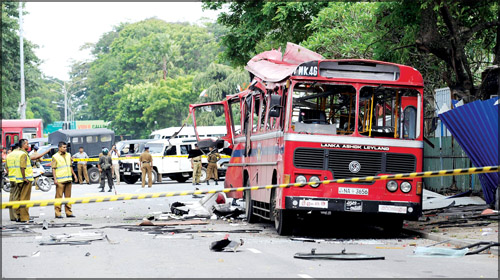Many faces and mutations of terror
T. S. JAISOORYA
Even while there is an increasing attempt to fund and focus research
on terror networks, terrorism has mutated indescribably so often that
experts are often bewildered at the speed, dexterity and innovativeness
that characterise many of their actions.
The most striking is the changed global profile of a terrorist who is
more likely to be the highly skilled technocratic-happy, well-adjusted,
productive, successful and contented looking boy or girl next door
rather than angry, cantankerous, poorly educated poverty stricken man on
the street.
 |
|
The LTTE has been targeting civilian
buses. |
This integration of terror networks into our neighbouring streets has
often left the security apparatus with very little avenue to either
identify or discern their intentions. This has led to increasing concern
about the emergence of amorphous and largely unknown terrorist
individuals and groups operating independently with many of them
actively recruiting suicide bombers, female and child terrorists.
Terror rationale
The lack of any concrete finding on known psychological tests could
also indicate that we have possibly not been able to determine any
difference with our current psychological measures. Terrorists thus as
per our current understanding do not demonstrate any unique set of
qualities, and are not discernibly different, in psychological terms, or
in terms of unique biographical histories, from those who reject
terrorism.
While psychopathic or otherwise mentally ill individuals may on
occasion engage in acts of terrorism, or be recruited by terrorist
groups, these would be exceptions, rather than the rule.
Most terrorists are likely to have a high measure of discipline,
submission to authority, and capacity for ‘rational’ behaviour - albeit
within an alternative rationality which is acceptable in their own
sub-culture. This alternate rationality - though morally reprehensible
underlies the decision in favour of terrorism.
Terrorists convince themselves that violence targeting non-combatants
and innocents is the ‘only means’ to achieve their ‘noble’ objectives
under prevailing conditions, and that, consequently, the use of this
method is acceptable for the purported ‘greater good’.
Nevertheless, the core conflict in this terror rationale, which
terrorists have to overcome, is the inherent moral contradiction. If you
are fighting for ‘freedom’, faith and injustice, how can you terminate
the freedom of others by killing them? How do you inflict the injustice
of indiscriminate killing on others ? How do you kill other members of
the same faith without guilt ?
The inherent success of each terrorist group crucially lies in their
management of these contradictions and psychological conflicts that
arise out of these. Further and most crucially the success of any
counter terrorist measure, which is long lasting, is to work through the
conflicts and dissensions that arise over the fundamental moral
contradiction.
Group dynamics
It is thus principally the psychological group dynamic that is most
significant in understanding and countering terrorist behaviour, rather
than the psychology of the individual. Throughout history, organisations
such as the military have harnessed this power of the group to motivate
individuals.
The terrorist group provides camaraderie, a sense of purpose and
importance, of participating in history, in a noble undertaking. Group
membership also creates a sense of power and of what has been described
as ‘revolutionary heroism’, compensating for personal insecurities,
failures and frustrations.
The secretive, conspiratorial and tightly controlled operational
environment of the radical group also helps ‘seal off’ the individual
from the values and expectations of ‘normal’ society, creating an
alternative world within which a coherent ideology and belief system is
systematically propagated and internalised, justifying the use of
terrorist violence for the ‘greater good’.
Gradually, the collective identity of the group completely dominates
the individual, reaching a pinnacle in the suicide bomber, who thinks
nothing of destroying himself to secure the group’s purpose.
Most people have begun to believe that terrorism is here to stay. Yet
democratic Governments and forces need to work out a cohesive and
comprehensive counterterrorist policy that should be tailor-made taking
into account the historical, cultural, political, and social context, as
well as the context of what is known about the psychology of a
particular group or its leaders.
Legal, political, diplomatic, financial, and psychological warfare
measures may be more effective.
The Hindu
|

